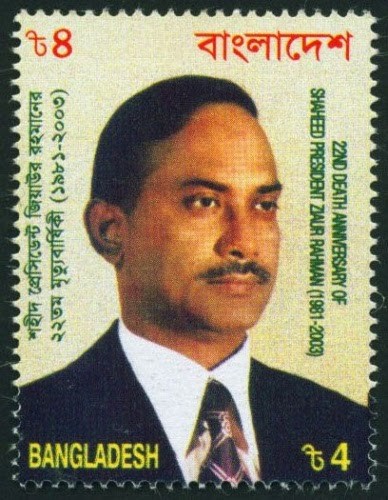justice’….involve economic growth…..stable prices and macroeconomic stability…..safety nets such as
food vouchers for the needy….programmes for human development….development of the marginalised sections.….Social justice, I would contend, is what Sen says Bangladesh is better at than India……
……………
……
Blogger-badshah and king of economists Jyoti Rahman makes the (convincing) case that Ziaur Rahman is the true father of modern-day Bangladesh, whose efforts have directly contributed to the (relatively) advanced social parameters as well a number of foreign policy achievements.
Indeed JR goes so far as to state that Bangladesh can be an inspiration to all the struggling Arab countries/people.
……….
….
Paraphrasing JR, while ZA Bhutto promised Islamic socialism in Pakistan, Ziaur Rahman actually implemented the same in Bangladesh; Sheikh Hasina (current PM) is now promising Islamic secularism. Perhaps Imran Khan will be better inspired by looking east instead of west.
……
The problem we have with Zia (and the other Zia as well) is that he rejected the concept of a secular republic. [ref. Wiki] The secularism principle was removed from the constitution in 1977 by Ziaur Rahman and declared Islam as the state religion. In 2010, Bangladesh Supreme Court restored secularism as one of the basic tenets of the Constitution but also kept Islam as the state religion.
While such a step may have been considered to be pragmatic (80% muslim pop) the practical impact has oscillated between bad and (mostly) worse.
While Islamic socialism/secularism has been good for Bangladesh it has not been so good for its Hindu minority which has pretty much one viable option: surrender your property and move to India. It has not really mattered which regime was ruling, military or civilian, Begum (1) or Begum (2). At least when the Bangladesh National Party (BNP) is in power, the atrocities against Hindus are highlighted (by Awami League aligned liberals). In contrast when the communal fires burnt recently in Jessore and in Chittagong there was not much ink spilled (analog or digital).
Also this. The only people in India who care to talk about ethnic cleansing of Hindus in Bangladesh are the Hindutva brigades. The fall-out from this (in the states/districts bordering Bangladesh) has been fairly predictable. As the (mostly) secular left fades away, the communal right is taking its place. Today, migrants from Bangladesh are under the gun everywhere (often literally, as in Bodoland).
Unless people find a way to reconcile thousand year old hostilities and neutralize poisonous ideologies, things will go from bad to worse, everywhere.
………………….
Had he not been killed in 1981, Ziaur Rahman would have been 76
today. Despite the twists and turns of politics, over three decades
from his death, when things actually work in Bangladesh, they work along
the path set by this military strongman turned a very popular
politician. And they work because the politics of synthesis crafted by
Zia had continued from the work of his predecessors, and his successors
saw the merit in keeping them.
….
Amartya Sen has noted how Bangladesh has better social indicators than
India despite having only half the per capita income. This theme has
been picked up by a number of 40th anniversary pieces that note that
Bangladesh has done pretty well when it comes to human development,
despite unfriendly nature and dysfunctional politics.
As it happens,
the beginning of pretty much all the examples of ‘good results’ recorded
by Bangladesh can be traced to the Zia era.
…
Take
population control for example. In the 1970s, population was growing
by 3% a year, and was expected to double to 150 million by the
mid-1990s. That has been delayed by well over a decade, and population
growth rate is now between 1-1.5%. At the time of
independence, Bangladeshi women on average had 7 children. By 2008,
according to the World Bank, fertility rate had fallen to 2.3 — close to
replacement level that stabilises population.
….
And unlike in China or India, the decline in fertility rate hasn’t
been accompanied by grotesque discrimination against female infants
(effectively female infanticide in places). In fact, on metrics related
to living standards of poor women, Bangladesh tend to pretty well
compared with its peers.
….
The reason for this includes concerted government efforts — something
again initiated by the Zia regime, and continued by everyone since.
But activities of the NGOs and the emergence of the ready made garment
sector have also played their part.
Of course, both the first Aarong
shop and Desh Garments (first RMG factory) started when Zia was the
president.
What about self sufficiency in food? The green revolution came to Bangladesh under Zia.
What about the remittance boom that has kept Bangladesh afloat for the past decade? The Gulf labour market opened under Zia.
….
I would contend that Zia succeeded not because his task was easier,
but because he was a pragmatic technocrat who eschewed ideology and
grandiosity, and adopted ‘whatever works’. Thus, for example, he
facilitated the NGOs to expand not because there was an ideological
dispensation for it, but because he recognised that these agencies were
providing a service that the state machinery was incapable of
delivering.
….
From all accounts, Zia’s pragmatism seems to be
heavily influenced by Deng Xiaoping’s philosophy of ‘crossing the river
by feeling the stones’.
Instead, what Zia claimed to base his economic policies was ‘social
justice’ – সামাজিক ন্যায়বিচার in Bangla. Now, social justice has never
actually been defined formally. But we can guess what he would have
meant by this from the policies and developments adopted and initiated
under his watch.
….
I would contend that social justice would involve economic growth,
which translated into jobs and income from the rural and urban poor and
less affluent classes. I would contend that social justice would mean
stable prices and macroeconomic stability. I would contend that social
justice would mean government programmes that ensure safety nets such as
food vouchers for the needy.
…..
Social justice, I would suggest, would
involve active government programmes for human development, and
particularly development of the marginalised sections of the society.
….
Social justice, I would contend, is what Sen says Bangladesh is better at than India.
….
Interestingly, across the Muslim world, parties that are coming to
power with popular mandate seems to contain ‘social justice’ or related
terms such as welfare or development in their names. It seems that
Ziaur Rahman pioneered a synthesis that is still all too relevant not
just in Bangladesh, but in other similar countries too.
…….
Link: http://jrahman.wordpress.com/2012/01/19/the-politics-of-synthesis-2-society-and-economy/
……
regards


